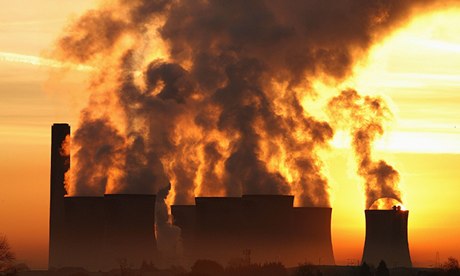Anti-carbon divestment campaign targets £5bn of British funds
An international campaign to urge large institutions to dump fossil fuel investments reaches the UK this week, following rapid success in the US.
The year-old divestment campaign, Fossil Free, has grown even faster than similar efforts that once targeted apartheid, tobacco and arms manufacturers. It now aims to focus attention on the £5bn invested in coal, oil and gas by the endowment funds of UK universities. The move comes as financial giants such as HSBC, Deutsche Bank and Goldman Sachs are starting to take seriously the prospect that global action to reduce carbon emissions could leave two-thirds of the world's proven fossil fuel reserves unburnable and worthless.
"The divestment campaign will start politically to bankrupt the fossil fuel industry and throw into stronger relief that it is a rogue industry, committed to burning more carbon than any government on Earth thinks it would be safe to burn," said Bill McKibben, a prominent US climate campaigner and figurehead of the Fossil Free campaign. "One reason we are losing the battle againstclimate change – the most important challenge humans have faced – is the power of the fossil fuel industry to block change," he told the Observer. "It is the richest industry in the history of human enterprise."
The US campaign has already led to more than 40 institutions, including the city of Seattle, universities and churches, pulling out of fossil fuel investments. Addressing the political debate in the UK over rising energy bills, McKibben said: "England has been burning fossil fuels since James Watt: there is no way you get to transition [to low-carbon energy] for free. But as economist Lord Nicholas Stern has said over and over again, the cost of not doing it is orders of magnitude higher than doing it."
Student divestment campaigns have sprung up at 20 UK universities, including the three with the largest investments: Cambridge, Oxford and Edinburgh. UK universities have more than £5bn – £2,000 per student – invested in fossil fuels, according to student group People & Planet and the 350.org campaign, which McKibben co-founded.
"Investing in fossil fuel companies, which harm communities and destroy the climate, is not OK," said Miriam Dobson, from People & Planet at Edinburgh University, where the campaign tour begins on Wednesday before visiting Birmingham and London.
British campaigners claimed a first victory last week, with the University of Surrey shifting funds from two unnamed fossil fuel companies into a renewable-energy-focused company.
The report also lists the research funding that companies, including Shell and BP, give universities, including £6m to Oxford and £17m to Imperial College London. "UK universities have become victims of corporate capture," said Kevin Smith from oil and gas watchdog Platform. "We are allowing public infrastructure to be used to subsidise a dangerous, outdated energy model."
A separate report found that the fossil fuel divestment campaign is growing faster than any previous one. "Stigmatisation poses a far-reaching threat to fossil fuel companies," said Ben Caldecott, a research fellow at the University of Oxford's Smith School of Enterprise and the Environment, and an author of the report. "In every case we reviewed, divestment campaigns were successful in lobbying for restrictive legislation."
The divestment campaign argues that there is also a financial reason for getting rid of fossil fuel investments, because increasing policies to cut carbon will eventually impact on the stocks' value. The landmark climate change report in September, from the Intergovernmental Panel on Climate Change, stated that agreement by the world's governments to restrict global warming to less than 2C meant keeping total future carbon emissions under 500 gigatonnes. Analysis by the International Energy Agency and the Carbon Tracker thinktank has shown this would mean that about two-thirds of the coal, oil and gas on the books of fossil fuel companies would have to remain unburned.
Carbon capture and storage technology would, if developed successfully, bury emissions equivalent to just 4% of total global reserves, according to Carbon Tracker.
With the 200 biggest fossil fuel companies spending $674bn in 2012 on finding new reserves (compared to $281bn renewable energy investment), the risk of inflating a stock market "carbon bubble" to the tune of trillions of dollars is "very big indeed", according to Stern. "The financial crisis has shown what happens when risks accumulate unnoticed," he said in April.
On Thursday, a group of 70 global investors with $3 trillion of collective assets launched the first coordinated effort to demand that the world's 40 leading fossil fuel companies, including ExxonMobil andf BHP Billiton, assess the financial risks a carbon bubble poses to their businesses.
"Companies must plan properly for the risk of falling demand to minimise the risk our clients' capital is wasted," said Craig Mackenzie, at Scottish Widows Investment Partnership, one of Europe's largest asset management companies. Storebrand, a $76bn Norwegian pension fund, divested from 19 fossil fuel companies in July, saying that the stocks would be "worthless financially" in the future.
While stock markets, including London which is heavily exposed to coal, have yet to significantly adjust company valuations, big financial players have started analysing the issue with reports in the last six months on the future risks of coal investments from Deutsche Bank, Goldman Sachs and Citi Commodities, while Morgan Stanley and Citi GPS have examined the wider energy market.
McKibben said the divestment campaign was one front in the battle against climate change, but a vital one given the role of similar tactics in previous historic changes, such as ending apartheid in South Africa. The Nobel peace prize winner Archbishop Desmond Tutu has blessed the movement, stating: "Divestment played a key role in helping liberate South Africa. The corporations understood money even when they weren't swayed by morality. Climate change is a deeply moral issue, too."








No comments:
Post a Comment